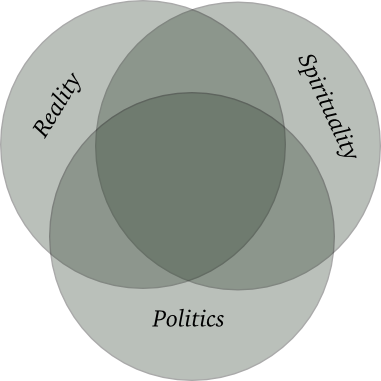
IT'S BEEN SOME TIME SINCE I last added a post to this series, so I'll begin with a very brief review for those of you who haven't been following it from the beginning.
There's a general agreement on all sides that the world is currently a dangerous place for humans—as individuals, as groups, and even as a species—and that most of this danger comes from humans themselves.
Whether we think of the danger specifically as nuclear war, socialism, global warming, or fascism—whether we believe the source is liberals or conservatives, religion or atheism, intellectuals or rednecks, latte lovers or beer-drinkers, we agree that the problem has to do with how we humans are managing our affairs.
No one blames the cows, on the whole.
We are all looking for a way out of the mess, whether we think of the mess as global, local, or personal.
And we also tend to agree that the problem has three aspects, all of which are intertwined:
-
Spirituality: the way in which go about being human.
-
Reality: the way in which we discern the truth about the world.
-
Politics: the way in which we deal with power.
Each or those three aspects contain the other two, if you think about it:
-
My ways of deciding what is real and my ways of being human are part of my way of dealing with power.
-
My ways of being human and my ways of dealing with power are part of my way of deciding what is real.
-
My ways of dealing with power and my ways of deciding what is real are part of my way of being human.
Each of those three ways are equally important on all three levels of our existence:
-
Individually—our personal spiritual life, our personal search for truth, our internal power struggles.
-
Communally—our relationships in our private and professional lives, how we go about being human, discerning the truth, and dealing with power there.
-
Nationally and globally—how we deal with large-scale human issues, how we relate to other human communities, how we deal with the power struggles of humanity as a whole.
It's impossible to separate them.
The way I treat others is very likely the way I treat myself, and vice versa.
And at the root of how I treat myself, or others, is my perception of my own value, and of theirs.
If I think of myself as "bad" at my core, then I will think of others as bad at their core, as well.
I will think that I, and they, need to be forced to follow a set of rules, to keep us from doing those "bad" things which we would naturally do.
And since our natural inclinations are "bad" we will need someone—a king or a dictator or master—to force us to follow those good rules that go so completely against our "evil" nature.
The idea that we are bad, that humans are somehow naturally evil, is so very closely connected with the idea that we need to be enslaved that it should make us suspicious.
Who invented this way of thinking?
Is there any reason to believe it's true?
If it's not true, what is the truth about humans?
And how do we get from here to there?
But first, a parable...






